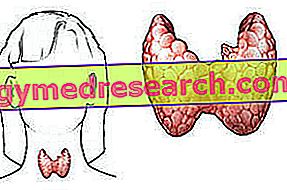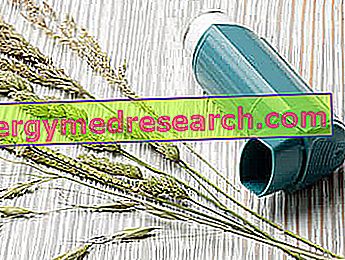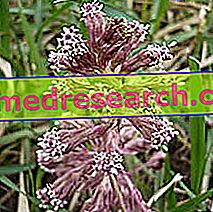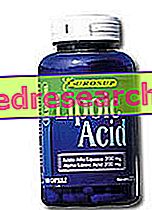Generality
Thyroid antibodies are components of the immune system mistakenly directed against the thyroid gland or against some fundamental factors for its normal functionality. This can result in very serious pathological consequences, such as chronic inflammation (thyroiditis), tissue damage or gland dysfunction.

The determination of anti-thyroid antibodies can be performed to establish a diagnosis and / or to monitor an autoimmune thyroid disease . Normally, the dosed autoantibodies are directed against thyroglobulin ( AbTG ) and thyroid peroxidase ( AbTPO ).
Thyroid: Outline of Anatomy and Functions
The thyroid is a small endocrine gland shaped like a flattened butterfly, located in the anterior region of the neck. The main hormones it produces - thyroxine (T4) and triiodothyronine (T3) - essentially regulate the speed with which energy is used by the body.
Thyroid hormone production is activated and deactivated via a feedback system (feed-back). Among the various factors involved in this mechanism, the thyroid stimulating hormone ( TSH ) is responsible for maintaining a stable concentration of thyroid hormones in the bloodstream. Therefore, when thyroid antibodies interfere with this process, chronic diseases and autoimmune diseases associated with hypothyroidism or hyperthyroidism can develop, such as Graves' disease or Hashimoto's Thyroiditis.
What's this
Thyroid, Antibodies and Autoimmmuni Diseases
In the blood of some subjects suffering from diseases of the thyroid it is possible to isolate abnormal antibodies, which attack the gland and compromise its correct functionality. These antibodies, synthesized by the same organism, are characteristic of some thyroid diseases of autoimmune origin, such as Graves-Basedow's disease and autoimmune thyroiditis (or chronic lymphocytic thyroiditis), such as Hashimoto's thyroiditis and adult idiopathic myxedema.
The dosage of anti-thyroid antibodies in the blood can help the doctor to recognize thyroid diseases on an autoimmune basis, and to distinguish them from other forms that do not affect the immune system.
The most used anti-thyroid antibodies in clinical practice are directed in particular against thyroglobulin ( AbTG ) and thyroid peroxidase ( AbTPO, initially known as anti-microsome antibodies).
Anti-Thyroglobulin Antibodies
Thyroglobulin is the glycoprotein molecule, deriving from tyrosine, a precursor to the thyroid hormones T3 and T4, synthesized thanks to the organization of iodine in its tyrosine residues by the enzyme thyroperoxidase.
Thyroglobulin autoantibodies are present in most patients with Hashimoto's thyroiditis (60%) and adult idiopathic myxedema, in over 30% of patients with Basedow-Graves' disease and to a certain degree (often in transient form) in patients with postpartum thyroiditis or subacute thyroiditis of De Quervain.
The test can be positive even in patients with thyroid cancer and thyrotoxicosis, and in carriers of non-thyroid autoimmune diseases, such as:
- Systemic lupus erythematosus;
- Rheumatoid arthritis;
- Type I diabetes mellitus;
- Atrophic gastritis;
- Addison's disease.
Pregnancy can also be accompanied by the appearance of anti-thyroglobulin antibodies in the blood.
Anti-Thyroperoxidase antibodies

Thyroperoxidase (anti-TPO) autoantibodies are found in the serum of almost all patients with Hashimoto's thyroiditis or adult idiopathic myxedema (95%), and in about 80-85% of people with Basedow's disease.
Similar to what we have seen for anti-thyroglobulin autoantibodies, high anti-TPO antibody titers are also recorded in patients with non-thyroidal organ-specific autoimmune diseases and in about 10% of normal subjects. A similar situation occurs during pregnancy, for which there is an increased risk of developing postpartum thyroiditis in case of positivity to anti-thyroperoxidase antibodies recorded in the first trimester.
Why do you measure
- The examination of thyroid antibodies determines its presence and quantity.
- The dosage of anti-thyroid antibodies in the blood is indicated as a support for the diagnosis and monitoring of autoimmune thyroid diseases.
- The examination also contributes to the distinction of autoimmune diseases from other pathological conditions affecting the thyroid.
- The dosage of thyroid autoantibodies allows to address the therapeutic treatment.
When is the exam prescribed?
The dosage of anti-thyroid antibodies can be prescribed:
- In case of increased size of the thyroid gland (goiter) and / or if other functional tests (such as T3, T4 and TSH) are indicative of an alteration of the gland.
- Together with the thyroglobulin (Tg) examination in pathology monitoring.
- At regular intervals, in case of known autoimmune thyroid disease.
Normal values
- Anti-peroxidase antibodies (AbTPO): below 35 IU / mL;
- Anti-tieroglobulin antibodies (AbTG): below 20 IU / mL;
- Anti-TSH receptor antibodies (AbTR): below 1.75 IU / L.
High thyroid antibodies - Causes
Concentrations of mild or moderately high antithyroid antibodies may be present in various thyroid and autoimmune disorders such as:
- Thyroid cancer;
- Type I diabetes;
- Rheumatoid arthritis;
- Pernicious anemia;
- Autoimmune diseases of vascular collagen.
Significantly increased values are found more frequently during thyroid autoimmune diseases, such as Hashimoto's thyroiditis and Graves-Basedow's disease.
High levels of anti-thyroid antibodies may also indicate the presence of:
- Systemic lupus erythematosus (SLE);
- Addison's disease;
- Atrophic gastritis.
During pregnancy, there may be increases in antithyroid antibodies without a particular significance; in any case, if present during gestation, anti-thyroid antibodies increase the risk of hypothyroidism or hyperthyroidism in the fetus or newborn.
A certain percentage of healthy subjects may be positive for one or more thyroid antibodies. The prevalence of these tends to increase with age (especially in females) and indicates an increased risk of developing thyroid disease in the future.
Low thyroid antibodies - Causes
Values of low antibodies should not be cause for concern. Their absence or reduced concentration simply indicates that there are no antibodies able to predispose to thyroid dysfunction.
How to measure it
The dosage of anti-thyroid antibodies involves taking blood from a vein in the arm.
Preparation
The blood sample is usually taken in the morning. Your doctor will suggest if you need to be fasting.
Interpretation of Results
In general, the presence of thyroid antibodies suggests an autoimmune involvement of the thyroid. A negative test result indicates instead that autoantibodies are not present in the circulation at the time of collection and may indicate that the disease is due to causes other than autoimmunity.
Diseases associated with Thyroid Antibodies
High levels of these antibodies are recorded both in Graves-Basedow disease and in Hashimoto's thyroiditis; the distinction between the two diseases is however easy, since the former is typically associated with hyperthyroidism, while Hashimoto's disease typically correlates with hypothyroidism.
Peculiar to Graves' disease are anti-thyroid antibodies directed in particular against TSH receptors, the pituitary hormone that stimulates the gland to synthesize thyroid hormones; it is the stimulation of these receptors induced by antibodies to enhance the synthesis of T3 and T4, configuring the typical picture of hyperthyroidism, often associated with goiter. Nevertheless, the search for TSH anti-receptor antibodies (TRAb - TSH-Receptor Antibody) during Basedow-Graves hyperthyroidism is not widespread, as the diagnosis is based on other clinical and bio-humoral parameters. However, the dosage of TRAb has a specific indication in pregnancy, because the relief of these antibodies with a high titre, given the ability to cross the placenta, can make one suspect the presence of fetal hyperthyroidism and predict the onset of neonatal thyrotoxicosis.
Levels of mild or moderately elevated anti-thyroid antibodies can also be observed in healthy patients with normal thyroid function; however, these subjects should be monitored over time, as an increased risk of future thyroid dysfunction related to the presence of these antibodies is ascertained.



